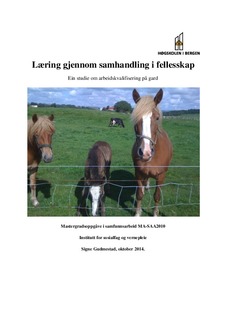| dc.contributor.author | Gudmestad, Signe | |
| dc.date.accessioned | 2018-02-01T15:09:25Z | |
| dc.date.available | 2018-02-01T15:09:25Z | |
| dc.date.issued | 2014-10 | |
| dc.identifier.uri | http://hdl.handle.net/11250/2481883 | |
| dc.description | Masteroppgave i samfunnsarbeid. | en_GB |
| dc.description.abstract | Bakgrunn/føremål: Grønt arbeid er eit av dei tiltaka som vart etablert i 2004 i regi av Nav sitt prosjekt, Vilje viser vei, for å styrka tilgjengelegheita til arbeid og arbeidsmarknadstiltak for menneske med psykiske helseproblem og/eller rusproblem. På garden som arena for Grønt arbeid skal medarbeidarane få arbeidserfaring, arbeidstrening, arbeidsavklaring og arbeidskvalifisering med mål om å koma tilbake til aktivitet eller arbeid. Føremålet med studiet mitt er å få auka innsikt i kva medarbeidarane som er i arbeidstrening på gard lærer gjennom å samhandla i arbeidsfellesskapet, og om det dei lærer kvalifiserer dei til ordinært arbeid. Teoretisk forankring: Utgangspunktet for studien er samfunnsarbeid, som er å undersøka og påverka vilkår for sosial deltaking. Kjerneomgrep er fellesskap, kritisk medvit, mobilisering, sosial kapital, deltaking og dialog. Metode: Det empiriske grunnlaget for studien er produsert gjennom feltarbeid på to gardar med deltakande observasjon, walk-along intervju, semistrukturerte intervju og feltsamtalar med medarbeidarar, bønder og sakshandsamarar. Eg har også besøkt andre gardar og snakka med andre bønder som tilbyr Grønt arbeid, og delteke på ulike møte ilag med bønder som tilbyr velferdstenester på garden som arena. Vidare har eg vore med på faglege turar og samlingar i saman med ei forskingsgruppa som forskar på velferdstenester på garden som arena, i regi av koordinatoren for Inn på tunet hjå Fylkesmannen. Kunnskapsbidrag/funn: Studiet har eit samfunnsarbeidsperspektiv som er tufta på ei forståing av at deltaking og fellesskap er uløyseleg knytt saman. Sosial deltaking føreseier nokre individuelle, strukturelle og relasjonsmessige føresetnader hjå den enkelte, i arbeidsfellesskapet, og på garden som arena. Mi forsking viser at dette er viktige føresetnader for å kunna læra gjennom samhandling i fellesskap, og for at læringa skal medverka til kvalifisering til ordinært arbeid. I tillegg så er det viktig at tiltaka er medvitne på kva dei skal kvalifisera folk til. Vidare forsking: Både medarbeidarane og bøndene opplever og erfarer at overgangen til ordinært arbeid kan vera vanskeleg, og at nokon treng lenger tid i tiltaket før dei er kvalifiserte. Det trengst vidare forsking på kva som skjer med medarbeidarane etter avslutta tiltak. Kjem dei seg ut i ordinært arbeid og på kva måte får dei bruk for det dei har lært på garden, på andre arenaer og i arbeidslivet? | en_GB |
| dc.description.abstract | Background/purpose: Grønt arbeid is one of the interventions that were established in 2004 under the auspices of the Nav project Vilje viser vei, to improve access to employment and labour market interventions for people with mental health problems and/or substance abuse problems. On the farm as arena for work, the staff of Grønt arbeid are intended to gain work experience, job training, rehabilitation and employment eligibility aiming to come back into activity or work. The purpose of my study is to gain more insight into what the workers who participate in job training on a farm learns through collaborating in the work community, and into whether what they have learnt qualifies them to ordinary work. Theoretical foundation: The basis of the study is community work, which is to examine and influence the conditions for social participation. Core concepts are communities, critical consciousness, mobilization, social capital, participation and dialogue. Method: The empirical material is collected through fieldwork on two farms with participatory observation, walk-along interviews, semi-structured interviews and field conversations with workers, farmers and executive officers. I have also visited other farms and talked to other farmers who offer Grønt arbeid, and participated in various meetings with farmers who offer welfare services on the farm as arena. Furthermore I have joined academic excursions and gatherings with a research group that do research on welfare services on the farm as arena, organized by the County Governor’s Inn på tunet coordinator. Findings/Contributions: The study has a community work perspective based on an understanding that participation and community are inextricably interlinked. Social participation prescribes some individual, structural and relational qualifications in the individual, in the working community and on the farm as an arena. My research shows that these are important qualifications for being able to learn through community collaboration, and for the learning to contribute to the qualification for ordinary work. It is also important that the employment measures are conscious of what they are qualifying people to. Further research: Both the workers and the farmers experience and find that the transition to ordinary work can be difficult and that some need more time in the intervention before they are qualified. Further research is needed on what happens with the workers after the intervention is through. Do they attain ordinary work and in what way can they make use of what they have learnt on the farm, in other places/arenas and in the working life? | |
| dc.publisher | Bergen University College | en_GB |
| dc.subject | stad | |
| dc.subject | fellesskap | |
| dc.subject | samhandling | |
| dc.subject | samarbeid | |
| dc.subject | læring | |
| dc.subject | endring | |
| dc.subject | Samfunnsarbeid | |
| dc.subject | place | |
| dc.subject | community | |
| dc.subject | interaction | |
| dc.subject | collaboration | |
| dc.subject | learning | |
| dc.subject | change | |
| dc.subject | communitywork | |
| dc.title | Læring gjennom samhandling i fellesskap. Ein studie om arbeidskvalifisering på gard | en_GB |
| dc.type | Master thesis | |
